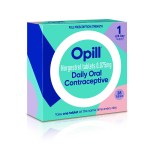A pharmaceutical company on Monday submitted an application to the FDA for an over-the-counter (OTC) birth control pill that, if approved, would be the first daily birth control pill available at pharmacies around the country without a prescription.
Frédérique Welgryn, the chief strategic operations and innovation officer at HRA Pharma, which produces the pill, said the submission of the application marks a “groundbreaking moment” in reproductive equity in the United States. The application submission has been a long time coming: HRA Pharma announced its intention to conduct research and submit its application in December 2016. The pill was approved in 1973 for prescription use.
Given the Supreme Court’s recent decision that overturned Roe v. Wade, the landmark ruling that had established a right to an abortion, experts predict that access to birth control is likely to become a major focus for policymakers in managing reproductive health. More than a dozen states have already moved to make it available over the counter, though some states still require a brief consultation with a pharmacist.
People in more than 100 countries can obtain oral contraception without a prescription. About one-third of adult women in the United States who tried to obtain prescription contraception reported challenges, including cost barriers, a lack of insurance and an inability to make an appointment or get to a clinic.
The American College of Obstetricians and Gynecologists, the American Medical Association and the American Academy of Family Physicians have expressed public support for OTC birth control pills.
“Access is one of the most cited reasons why patients do not use oral contraceptives, use them inconsistently or discontinue use,” David Aizuss, an American Medical Association board member, said in a statement. “Expanding OTC access would make it easier for patients to properly use oral contraceptives, leading to fewer unplanned pregnancies.”
-
More from The 19th
- With abortion rights in limbo, conservative lawmakers are eyeing restrictions on IUDs and Plan B
- North Carolina no longer requires a doctor’s prescription for birth control. But who can afford it?
- These influencers are using their TikTok platforms to make abortion-related #sponcon
But over-the-counter oral contraception doesn’t come without potential drawbacks: Health insurers may subsidize a smaller percentage of the cost — if they elect to cover it at all.
Since the passage of the Affordable Care Act in 2010, insurance companies have been required to cover the cost of birth control — but only prescription methods. Insured people on average went from paying a 94 percent share to just 11 percent. The uninsured, however, face annual out-of-pocket costs as high as $600 for oral contraception . Many reproductive justice advocates remain concerned that birth control will remain unaffordable for the young, the poor and the uninsured.
Carrie Baker, a women and gender studies professor at Smith College, told The 19th earlier this year that only nine states currently have explicit provisions that would require insurance companies to pay for OTC birth control, whether or not the patient is covered.
“If insurance companies don’t cover the cost, low-income women — disproportionately women of color — will not benefit,” Baker said in that interview.
The pill became the first FDA-approved contraceptive more than 60 years ago and is currently the most commonly used form of contraception. Younger White women are most likely to opt for the pill, taken daily.






